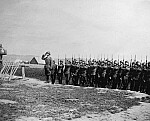June 14, 1982: The Day the Falklands war ended
On June 14, 1982, the guns finally fell silent in the South Atlantic. After 74 days of bitter combat, the Falklands War between the United Kingdom and Argentina came to an end. What began as a sudden invasion had escalated into a full-scale military conflict, drawing the attention of the entire world. The war would leave a lasting impact on both nations and reshape their military doctrines, politics, and national psyches for decades to come.

Picture: British sailors from HMS Cardiff ashore Pebble Island June 1982 | Wikimedia Commona / Public domain
The Origins of the Conflict
The Falkland Islands (Islas Malvinas in Spanish), a remote British Overseas Territory located some 300 miles off the coast of Argentina, had been a source of tension between the two nations for over a century. Argentina had long claimed sovereignty over the islands, arguing that they inherited the territory from Spain after independence. Britain, on the other hand, maintained administrative control since 1833.
The dispute simmered for decades, but in 1982, Argentina's ruling military junta—facing domestic unrest, economic instability, and mounting political opposition—decided to take bold action. On April 2, 1982, Argentine forces landed on the islands and seized control, hoping to rally nationalistic fervor and distract from domestic problems. The gamble would ultimately prove disastrous.
Britain Responds
Caught off-guard but determined to defend its sovereignty and the right to self-determination of the islanders, the British government under Prime Minister Margaret Thatcher launched Operation Corporate, a major military task force to retake the islands. This was no small feat: the Falklands lay over 8,000 miles from the UK, stretching British logistics, naval capacity, and air power to their limits.
A fleet of over 100 ships was assembled, including aircraft carriers HMS Hermes and HMS Invincible, as well as destroyers, frigates, supply ships, and auxiliary vessels. The British Army, Royal Marines, Royal Navy, and Royal Air Force collaborated in one of the most complex amphibious operations since World War II.
The Course of the War
The British campaign was marked by a series of fierce engagements, both at sea and on land:
-
Naval Battles: British warships faced constant threats from Argentine air and submarine forces. The sinking of the Argentine cruiser ARA General Belgrano by the British submarine HMS Conqueror was a pivotal—and highly controversial—moment, effectively neutralizing Argentina's naval surface fleet. In retaliation, Argentina’s air force launched deadly Exocet missile attacks, sinking the HMS Sheffield and causing significant losses.
-
The Air War: Argentine pilots displayed tremendous skill and bravery, managing to inflict damage despite being outmatched by British Sea Harriers operating from aircraft carriers. Nevertheless, British air superiority gradually turned the tide.
-
Land Battles: After establishing a beachhead at San Carlos on East Falkland, British ground forces advanced across the rugged, windswept terrain toward Port Stanley, the islands' capital. Brutal battles took place at Goose Green, Mount Longdon, Mount Tumbledown, and Wireless Ridge, testing both the resolve and endurance of the troops.
June 14, 1982 — The War's Final Day
By mid-June, Argentine forces in Port Stanley found themselves surrounded, cut off, and facing overwhelming British firepower. Morale among Argentine conscripts—many of whom were poorly equipped, undertrained, and suffering from the harsh weather—was collapsing.
On the morning of June 14, under increasing pressure and facing inevitable defeat, Argentine commander General Mario Menéndez formally surrendered to British Major General Jeremy Moore. The official ceasefire took effect, bringing the 10-week conflict to an end.
British forces took 9,800 Argentine prisoners of war, who were repatriated shortly afterward. The Union Jack was raised again over Port Stanley, and for the islanders, British rule was restored.
The Human Cost
Though brief in duration, the war came at a high price:
-
British casualties: 255 killed, over 700 wounded.
-
Argentine casualties: 649 killed, over 1,000 wounded.
-
Civilian casualties: 3 Falkland Islanders were killed.
The conflict also left deep psychological scars, particularly among veterans from both sides who carried the trauma for years.
The Aftermath
The Falklands War had far-reaching consequences:
-
In Britain, the victory bolstered Prime Minister Margaret Thatcher’s political standing, contributing to her landslide re-election in 1983. The war also led to significant reforms and modernization within the British armed forces.
-
In Argentina, the defeat humiliated the military junta, hastening its collapse and paving the way for Argentina’s return to democratic rule in 1983.
-
For the Falkland Islanders, the war cemented their British identity. In the years following the conflict, the UK invested heavily in the islands’ defense and infrastructure. Today, the Falklands enjoy a stable economy (largely driven by fishing, tourism, and oil exploration) and remain a self-governing British Overseas Territory.
Strategic and Military Lessons
The Falklands War offered numerous military lessons:
-
The importance of air superiority, naval power projection, and logistics over long distances.
-
The vulnerability of surface ships to missile technology.
-
The enduring relevance of amphibious operations in modern warfare.
-
The necessity of joint operations between land, sea, and air forces.
In many ways, the war served as a rare example of conventional warfare between two state actors during the Cold War era, studied extensively by military academies around the world.
Legacy
Decades later, tensions between the UK and Argentina periodically flare over the sovereignty dispute, but the war remains a defining chapter in the modern history of both nations.
For Britain, June 14 is remembered as Liberation Day in the Falklands—a day of remembrance, pride, and solemn tribute to those who fought and died. For Argentina, it remains a bitter memory of national tragedy and a reminder of the dangers of military adventurism.
Ultimately, June 14, 1982, marks not only the end of a conflict but the beginning of new paths for both nations — one toward revitalized democracy, the other toward reaffirmed sovereignty.








